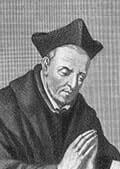the First Week of Lent
Click here to learn more!
Bible Commentaries
Lapide's Great Biblical Commentary Lapide's Commentary
New Testament
Jesus' life, teachings, and fulfillment of Old Testament prophecies as the Messiah. Mark
A fast-paced account of Jesus' ministry, focusing on his actions and sacrificial death. Luke
Jesus' life, emphasizing compassion for the marginalized and the universal scope of salvation. John
Theological reflections on Jesus as the Word of God, focusing on his divine nature and mission. 1 Corinthians
Paul addresses divisions, immorality, and spiritual gifts in the Corinthian church. 2 Corinthians
Paul's defense of his apostleship, his sufferings, and the power of God's grace. Galatians
Paul's defense of the Gospel of grace against legalism, emphasizing faith in Christ alone. 1 John
Teachings on love, obedience, and assurance of salvation through fellowship with God. 2 John
A letter encouraging love, obedience to God's commands, caution against teachings that deny Christ's truth. 3 John
A personal letter commending hospitality and warning against arrogance in church leadership.
Author's Biography
Cornelius a Lapide, born in 1567 in Belgium, stands as a towering figure in the world of biblical scholarship and exegesis. A Jesuit priest and theologian, he devoted his life to the study of Scriptures, embedding himself deeply in the rich traditions of Catholic thought. His work during the Counter-Reformation period was pivotal, providing a cornerstone for Catholic biblical interpretation that resonated well beyond his time.
A Lapide's magnum opus, "The Great Commentary," covered almost the entire Bible, with a notable exception of the Book of Job and a few others. This extensive work is celebrated for its meticulous attention to the Hebrew, Aramaic, and Greek texts of the Bible, demonstrating a Lapide's profound linguistic skills and deep understanding of the Holy Scriptures. His commentaries are not merely academic exercises; they are infused with a pastoral concern and a deep, abiding faith that seeks to illuminate the truths of the Bible for both scholars and laypeople alike.
What sets Cornelius a Lapide apart is his method of exegesis. He carefully wove together interpretations from the Church Fathers, later saints, and his own insightful observations, creating a rich tapestry of theological thought. His work is characterized by a commitment to the traditional Catholic understanding of the Bible, yet it is presented with clarity and depth that make it accessible to a broad audience.
A Lapide's legacy is a testament to his life's work-a harmonious blend of rigorous scholarship and devout faith. His commentaries have endured as invaluable resources for those seeking to delve deeper into the meanings behind the sacred texts, offering guidance and wisdom that continue to inspire theologians, pastors, and students of the Bible. Cornelius a Lapide passed away in 1637, but his contributions to biblical studies and Catholic theology remain influential, cementing his status as one of the most revered biblical scholars in the Catholic tradition.
